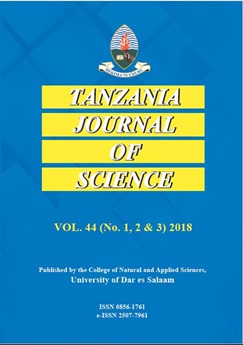Isolation and Quantification of Flavonoids from Kigelia africana (Lam.) Benth Fruit and Bark and their Antiradical and Antibacterial Activities
Abstract
Kigelia africana is an evergreen deciduous tree used in Zimbabwe folklore medicine for wound and diabetes ulcers healing. This paper reports the isolation and quantification of flavonoids from stem barks and fruits of K. africana as well as their antibacterial and antiradical activities. Flavonoids in ethanol and ethyl-acetate extracts were quantified using UV-Vis spectrophotometry and were found to be 213.490 ± 0.001 mg/L and 36.614 ± 0.001 mg/L, respectively per quercetin equivalent. The preparative and analytical thin layer chromatography was used to profile the flavonoids from fruits and barks using ethyl-acetate and petroleum ether (3:7 v/v) mobile solvent systems. Ethanol extract yielded three flavonoids with Rf values of 0.05; 0.79 and 0.93, while the ethyl-acetate extract yielded two flavonoids with Rf values of 0.21 and 0.73. The antiradical activities of the extracts were determined using DPPH radical scavenging method using quercetin as reference, and the activities were found to be over 80% at 150 mg/L. The disc diffusion method was used for antibacterial activity determination, and flavonoids from both ethanol and ethyl-acetate extracts showed zones of inhibition ranging from 0 to 22 mm against Staphylococcus aureus and Pseudomonas aeruginosa. Although the present study revealed that flavonoids from K. africana possess significant antibacterial and antioxidant activities, more studies are necessary for them to be incorporated in polyherbal formulations for wound and diabetic ulcer topical treatments.
Keywords: Diabetic foot ulcers; Kigelia africana; Antibacterial activity; Flavonoids; Antioxidant activity.


